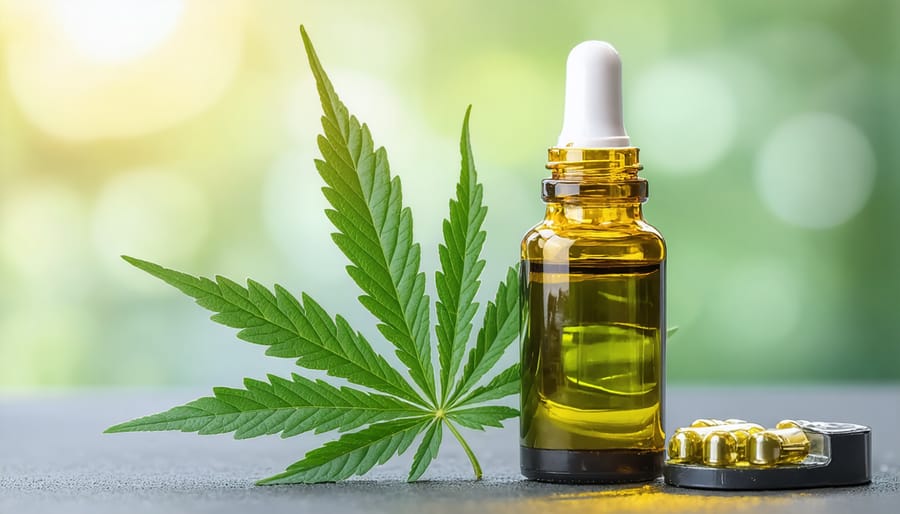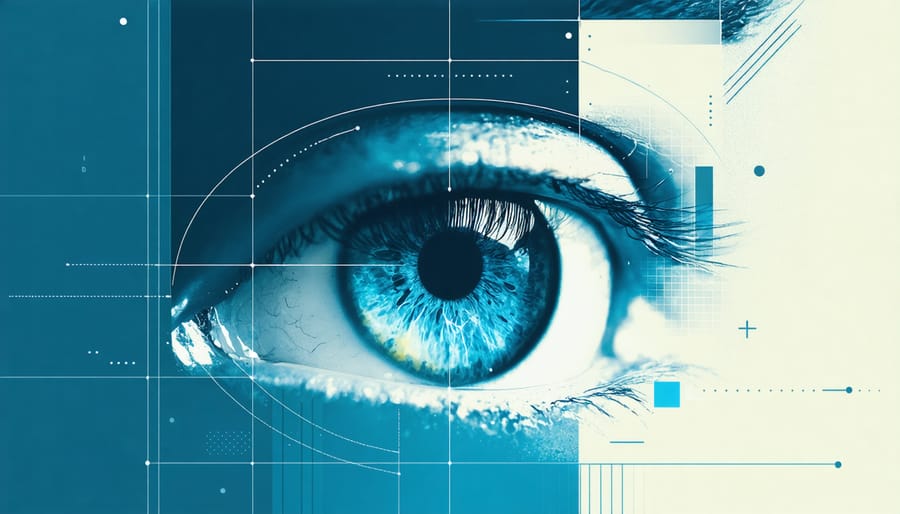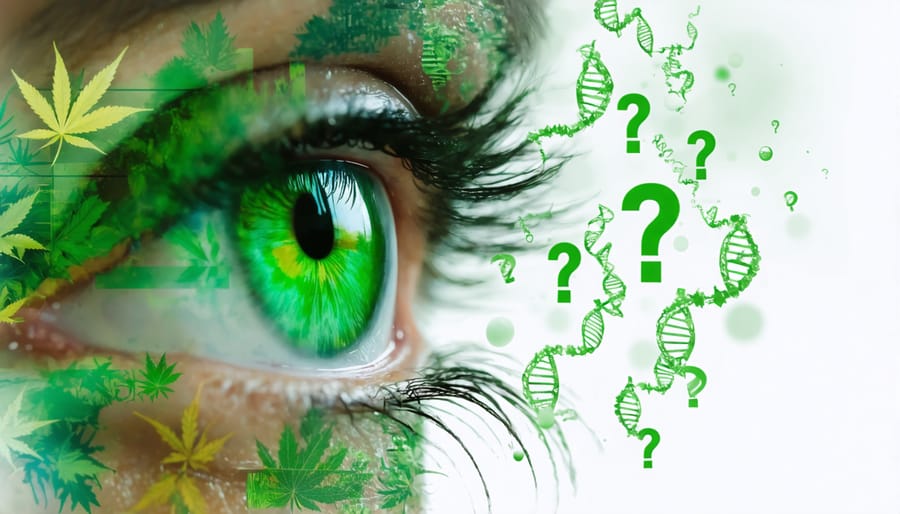Explore potential benefits and risks of CBD oil on eye health by starting with reliable research. **Consult healthcare professionals** to gather informed insights based on personal health conditions. **Examine current clinical studies** to assess the veracity of claims regarding improved vision or relief from eye-related ailments. **Track changes in eye health** closely after using CBD oil, noting any improvements or adverse effects. Incorporate lifestyle changes, such as using CBD for sleep, to enhance overall wellness, complementing eye care efforts. Always prioritize safety and informed decision-making when considering CBD for eye health.
Understanding CBD Oil
What is CBD Oil?
CBD oil, short for cannabidiol oil, is derived from the cannabis plant. It is extracted mainly from hemp, a variety of cannabis that contains low levels of THC, the psychoactive compound in marijuana. CBD oil is renowned for its potential therapeutic benefits, including pain relief, anxiety reduction, and anti-inflammatory properties. It is commonly used in various forms such as tinctures, capsules, and topical lotions. Although research is ongoing, many people turn to CBD oil for health issues, including those affecting eye health. However, understanding its implications on vision requires further scientific investigation. It is crucial to consult healthcare professionals before using CBD oil, especially for eye-related conditions.

How Does CBD Interact With the Body?
The endocannabinoid system (ECS) is a complex cell-signaling system in the body that plays a role in regulating various functions, including mood, pain, and immune response. Central to this system are cannabinoid receptors, mainly CB1 and CB2, which are found throughout the body. CBD, or cannabidiol, interacts with the ECS by influencing these receptors indirectly, enhancing the body’s production of its own cannabinoids. This interaction can potentially help modulate inflammation and neuroprotective effects, which are essential aspects when considering eye health. While research is ongoing, understanding how CBD affects the ECS may provide insights into its potential benefits for maintaining vision health.

Current Research on CBD Oil and Eye Health
Potential Benefits of CBD for Eye Health
Recent studies suggest that CBD, a compound derived from the cannabis plant, may offer several potential benefits for eye health. As interest in alternative therapies grows, understanding these potential benefits becomes crucial for individuals seeking to enhance their vision care. Research indicates that CBD might possess anti-inflammatory properties, which could mean it helps alleviate symptoms associated with certain eye conditions, such as glaucoma and macular degeneration. Inflammation in these conditions contributes to discomfort and vision impairment, and reducing it could potentially improve overall eye health.
Additionally, some studies explore CBD’s neuroprotective effects, which might be beneficial for retinal cells, playing a critical role in preserving vision. While more expansive studies are needed, these initial findings offer hope for CBD as a supportive option in eye health management. It’s essential for users to approach these findings with cautious optimism, understanding that while promising, they are still preliminary.
For individuals curious about integrating CBD into their eye care routine, it’s advisable to consult with healthcare professionals to determine the best strategies for their specific needs. Further insights on this topic are available in resources like CBD for eyesight. As research progresses, staying informed can empower individuals to make educated decisions regarding their eye health care.
Risks and Concerns
While CBD oil is gaining popularity for its potential health benefits, including for eye health, it’s important to be aware of the risks and concerns highlighted in current studies. Research on CBD’s effects on eyes is still in its infancy, and findings can be inconsistent. Some studies suggest that CBD might temporarily lower intraocular pressure, a critical factor in managing conditions like glaucoma. However, other research warns that CBD could actually increase this pressure over time, posing a risk to individuals with certain eye disorders.
Moreover, the lack of standardized dosages and regulation of CBD products means the quality and concentration can vary significantly, which might lead to unpredictable effects. Individuals using CBD oil should be cautious of possible interactions with other medications or health conditions. Consulting with an eye care professional before incorporating CBD oil into your regimen is highly recommended to ensure safety and avoid potential adverse effects. By staying informed and cautious, you can make better decisions regarding your eye health.
Gaps in Current Knowledge
While current research suggests CBD oil may have potential benefits for eye health, significant gaps remain. The existing studies are limited in scope, primarily focusing on animal models or laboratory settings, which may not directly translate to human applications. The long-term effects of CBD oil on eye health remain largely unexplored, particularly regarding potential interactions with other treatments or medications. Additionally, there is a need for well-designed clinical trials to determine optimal dosages and delivery methods for therapeutic efficacy without adverse effects. Addressing these gaps will help clarify the role of CBD oil in eye care and support informed decisions for its use in managing eye conditions.
Practical Considerations

Consultation with Eye Health Professionals
Before considering CBD oil for eye health, consulting with eye health professionals is crucial. These experts can provide personalized advice based on your specific eye condition and overall health. While CBD oil is gaining attention for its potential benefits, its effects on the eyes are not well-studied, and professional guidance can help assess if it’s a safe option for you. Eye health professionals can also discuss any potential interactions with existing medications or treatments you’re undergoing. Taking this step ensures that you are making an informed decision, keeping your eye health and safety a priority.
Legal and Safety Considerations
The legal status of CBD oil varies by region, so it’s crucial to check local regulations before use. In countries or states where CBD is legal, products must meet specific safety standards, such as containing less than 0.3% THC. Ensure you purchase from reputable sources that provide third-party testing results, indicating purity and potency. Safety considerations include potential interactions with medications, as CBD can affect how some drugs are metabolized. It’s wise to consult with a healthcare professional, particularly for those with eye conditions or taking prescribed treatments, to make an informed decision about incorporating CBD into their eye health regimen.
Choosing Quality CBD Products
When selecting high-quality CBD oil for eye health, consider a few key factors to ensure you choose a safe and effective product. Look for CBD oils that are third-party tested; these independent tests verify the product’s cannabinoid content and purity, confirming no harmful contaminants are present. Opt for full-spectrum or broad-spectrum formulations to obtain a range of beneficial cannabinoids and terpenes, potentially enhancing the therapeutic effects through the “entourage effect.” It’s essential to review the manufacturer’s reputation, ensuring they follow transparent sourcing and production practices. Additionally, consult with healthcare providers who can provide guidance on integrating CBD oil with other eye health enhancers like Omega-3 for eyes into your wellness routine. Understanding the dosage and product specifics helps maintain your eye health journey safely and effectively.
Conclusion
In conclusion, exploring the effects of CBD oil on eye health presents both potential benefits and areas that require further research. While preliminary findings suggest that CBD could offer benefits in managing inflammation and eye pain, its effects on intraocular pressure and other eye conditions remain inconclusive. It’s essential for individuals interested in using CBD products, such as CBD gummies, for eye health to do so cautiously and with a well-informed approach. Consulting with healthcare professionals and staying updated on the latest research can help ensure that any decisions are safe and beneficial. By taking an educated stance, individuals can make empowered choices about incorporating CBD into their eye health strategies, balancing hope with scientific evidence. Remember that personalized advice from eye care specialists should always guide your actions when considering any new supplement or treatment.

